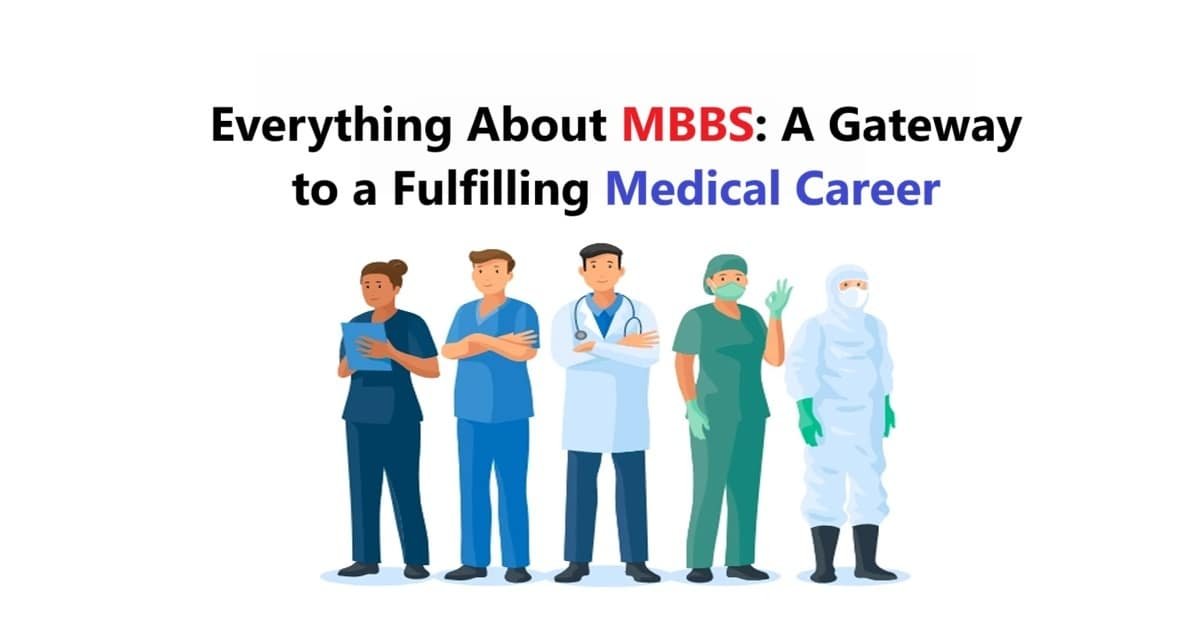Are you ready to embark on an extraordinary journey—a journey filled with relentless learning, profound experiences, and, most importantly, the chance to make a significant difference in people’s lives? If so, buckle up and read on! Today, we’re diving deep into the world of MBBS (Bachelor of Medicine, Bachelor of Surgery). This revered degree is not just an academic qualification; it’s a badge of honor, a stepping stone to a noble profession, and a commitment to serving humanity in its most vital sphere—healthcare!
What is MBBS?
To start, MBBS is an undergraduate degree in medicine and one of the most sought-after courses globally, known for its prestigious status and historical significance in the field of medical education. The acronym “MBBS” stands for “Medicinae Baccalaureus, Baccalaureus Chirurgiae.” Derived from Latin, the first part refers to the study of medicine and the second part to surgery. Together, they symbolize a comprehensive approach to healthcare, equipping graduates with a robust foundation in both theoretical understanding and practical skills.
The Path to Pursuing MBBS
The road to becoming an MBBS graduate is highly challenging; it requires determination, hard work, and an unyielding passion for the field. Here’s an overview of the steps involved:
- High School Education: Most medical schools require students to complete high school with a strong emphasis on science subjects, particularly Biology, Chemistry, and Physics. Extra-curricular activities that promote teamwork and leadership, like volunteering or joining science clubs, can also bolster your application.
- Entrance Exams: In many countries, admission to medical schools is highly competitive, necessitating the completion of rigorous entrance exams. Tests like the MCAT, NEET, or UCAT assess students’ aptitude and knowledge in relevant subjects and are crucial for gaining acceptance into medical programs.
- Medical School Curriculum: The MBBS program typically spans five to six years, depending on the country and university. The first few years concentrate on subjects like Anatomy, Physiology, Biochemistry, Pharmacology, and Microbiology. These foundational courses are vital for understanding the intricacies of the human body and diseases.
- Practical Training: As you progress, you will engage in clinical rotations in hospitals and clinics. These hands-on experiences—often referred to as “internship” or “clinical clerkship”—allow students to apply their learning directly and interact with patients under the supervision of experienced healthcare professionals.
- Final Exams and Degree Awarding: After successfully completing the curriculum, students must pass final examinations to earn the MBBS degree. Congratulations! You are now officially recognized as a medical practitioner!
Life as an MBBS Student
Being an MBBS student is an exhilarating yet demanding experience. Imagine diving into textbooks that dissect the wonders of the human body, exploring case studies that challenge your critical thinking, and participating in in-depth discussions that fuel your curiosity.
You’ll spend countless hours in the lab, meticulously observing dissections, practicing suturing techniques, and analyzing patient symptoms. Your classmates will become your family, as together you navigate the rollercoaster ride of late-night study sessions, exam preparations, and group projects.
However, this intensive academic environment also requires effective time management and self-care. Amidst this whirlwind of studies, it’s crucial to reserve time for relaxation, hobbies, and social interactions. Balancing your academic life while cultivating friendships will set a robust foundation for your future as a physician.
The Role of Technology in MBBS
In this digital age, technology plays an increasingly pivotal role in medical education. Online learning platforms, virtual simulators, and telemedicine tools are revolutionizing how medical students learn and practice their skills. For instance, a study revealed that virtual reality simulations have improved surgical accuracy by up to 20% compared to traditional methods. Imagine utilizing cutting-edge technology like VR simulations to perform surgeries or using AI-driven platforms to analyze complex medical cases. This dynamic integration of tech into the curriculum enhances learning experiences and prepares students for the rapidly evolving healthcare landscape.
Career Opportunities Post-MBBS
Upon earning your MBBS degree, a multitude of career pathways unfurls before you! Depending on your interests and aspirations, you may choose to:
- Pursue Postgraduate Studies: Many MBBS graduates opt for specialization by enrolling in postgraduate programs (MD or MS). Whether your passion lies in Surgery, Internal Medicine, Pediatrics, or another specialty, advanced training allows you to hone your expertise.
- Engage in Research: If you’re intrigued by the scientific process and love discovering new knowledge, consider a career in medical research. Contributing to groundbreaking studies can significantly impact healthcare policies and treatment protocols.
- Work with NGOs: With an MBBS degree, you can align your career with humanitarian values by working for non-profits or international organizations. You’ll have the opportunity to provide medical aid in underserved regions, work in public health initiatives, and contribute to global health challenges.
- Teaching and Academia: Passionate about sharing knowledge? Consider transitioning into teaching, inspiring the next generation of medical professionals with your experience, insights, and enthusiasm.
- Private Practice or Hospitals: Finally, you may jump directly into clinical practice. Whether working in private clinics, hospitals, or specialty care centers, your everyday work will involve diagnosing, treating, and supporting patients through their health challenges.
The Essence of Being a Doctor
While accolades and financial stability are certainly appealing aspects of being a physician, the true essence of pursuing an MBBS degree is the chance to change lives. It’s about being at the front lines of healing, providing comfort in times of distress, and serving as a beacon of hope for those in need.
The journey can be arduous, filled with sacrifices and challenges, but when you see a patient recover because of your efforts or when someone expresses their gratitude for your role in their healing process, the rewards far surpass the hurdles.
Final Thoughts
As we conclude this deep dive into everything about MBBS, we hope you feel exhilarated and inspired! The pathway to becoming a doctor is undoubtedly challenging, but it’s equally enriching, both personally and professionally. If you’re considering a future in medicine—arm yourself with determination, embrace continuous learning, and never forget the impact you can make in countless lives.
So, are you ready to wear your stethoscope with pride? Ready to step into a world of infinite possibilities and endless patient stories? The world of MBBS awaits you, prepared to unveil the extraordinary rewards of a medical career! Go forth, future physicians, and let your journey begin!


